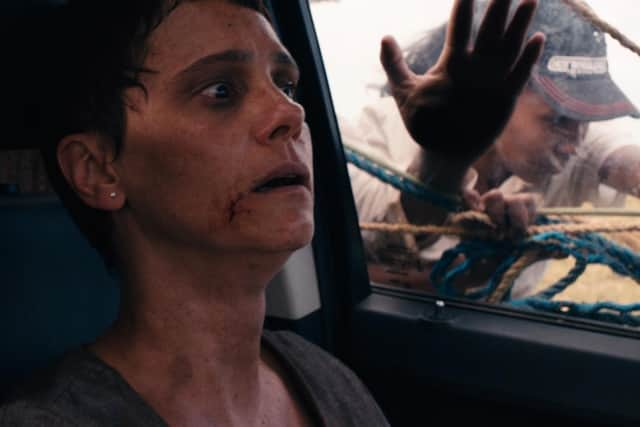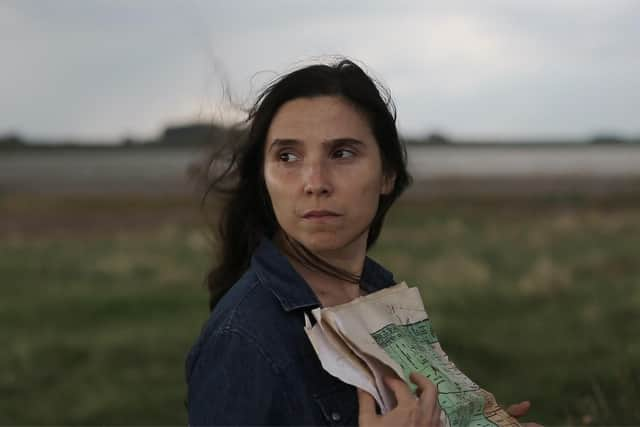Edinburgh International Film Festival reviews: Property | Trenque Lauquen | Passages | Femme
Property ****
Trenque Lauquen ***
Passages ****
Femme **
Brazilian thriller Property is the sort of hybrid arthouse genre effort you always hope to stumble across at film festivals but rarely do. Pulpy, propulsive and committed to its own desperate premise, its willingness to have morally ambivalent characters inflict pain and misery on each other as their respective worlds collapse in on them makes it a superlative example of feel-bad cinema. It requires audiences to have some grit, not just the filmmakers.
The feature debut of writer/director Daniel Bandeira, its exploitation movie set-up pitches its agoraphobic protagonist, Teresa (Malu Galli), into the midst of a savage class war by trapping her in an armoured car on her family’s estate just as her husband Roberto’s indentured workforce go into open revolt. These small-time farmers, led by steely-eyed matriarch Antonia (Zuleika Ferreira), have just learned that Roberto wants to repossess their land for a luxury hotel. He’s too spineless to tell them himself, though, and his foreman’s attempt to delegate the messenger job has backfired in a catastrophically brutal way. It has unleashed in this hastily formed workers’ collective an insurrectionary zeal borne out of the realisation that they’ve devoted their lives to the land with nothing to show for it but mounting debt. In other words, they’re mad as hell and not going to take it anymore. When Roberto and Teresa arrive in a bulletproof SUV, this high-tech panic-room-on-wheels becomes a prime battleground in the pitiless war of attrition that follows.
Advertisement
Hide AdAdvertisement
Hide AdIf Banderia was simply out to juice the audience by riffing on the terse, no-nonsense style of John Carpenter and Walter Hill, Property would score points simply for the nerve-jangling scenes of Teresa – swiftly isolated from Roberto – locking herself in the car while her former employees do everything they can to get her out (shotguns, smoke, even rats are involved, and various body parts are sacrificed to the cause). But Bandiera deepens the movie by refusing to make Teresa a contemptuous upper-middle-class stereotype.


We learn early on that the car has been purchased by her husband in a misguided effort to help her feel safe after being held up at gunpoint in broad daylight. That incident provides the film with its shock opening and it colours everything that follows, so much so that by the time Teresa encounters the revolutionary fervour already brewing on her countryside retreat, we understand her jangled, fight-or-flight impulses, just as we understand that Antonia’s ruthlessness is an instinctive reaction to her own out-of-options status in the world.
With neither side willing to concede, Property can’t help but go to some dark places. Luckily Bandiera has the nerve to ride the story all the way to its gnarly, lose-lose conclusion.
Staying in South America, Argentinian drama Trenque Lauquen tests audience resolve in a different way by serving up a four-hour puzzle-of-a-movie with no discernible solution. Not that irresolution is dealbreaker (it’s one of the key strengths of Zodiac, for instance). And not that its imposing length is too much of a challenge (the film is split into two parts and is being screened with an interval). But this sprawling, form-challenging, pseudo-procedural, about the search for a missing woman who might not want to be found, still shouldn’t be mistaken for a Gone Girl-style thriller.
Director Laura Citarella is more interested in exploring how the impulse to obsessively investigate the lives of others might really be a way for the characters to avoid confronting whatever’s missing from their own lives. This theme emerges across several nested storylines, all revolving around Laura (played by co-writer Laura Paredes), a botanist who’s been missing since her research project in the titular city came to an end. Told Rashomon-style from different perspectives in chapters that jump between the events immediately preceding and following her disappearance, the film strives to make Laura more unknowable with each new piece of information.


But the vaguely defined existential crisis powering her disappearance ultimately proves less compelling than some of the oddball plot turns Citarella deploys as narrative red herrings, among them a strange detour into David Cronenberg territory in which Laura becomes involved in a love triangle with two women who need her help developing a food source for the mysterious mutant creature they might (or might not) be raising in their attic.
A love-triangle of a more conventional sort – or at least a more realistic sort – is at the heart of Passages, the latest from Love is Strange director Ira Sachs, who specialises in dramas that capture the complicated dynamics of adult relationships in all their messy glory. Full of explicit sex and raw emotions, the Paris-set Passages is certainly a doozy on that front. It stars the sensational Franz Rogowski as Tomas, a bad-boy German filmmaker in the Fassbinder mould whose determination to control his personal life with the same dictatorial authority he displays on set starts meeting resistance when he embarks on a lusty affair with Agathe (Adèle Exarchopoulos).
Advertisement
Hide AdAdvertisement
Hide AdThough he’s also in a somewhat open marriage with mild-mannered designer Martin (Ben Wishaw), this latest infidelity prompts Martin to end their gone-stale relationship, if not definitively, then certainly temporarily. This sends Tomas into a tailspin as he keeps encroaching on Martin’s life while vigorously pursuing his own new relationship with Agathe (her career as a teacher means she’s at least had some experience with handling emotionally immature tantrum-throwers).
Part of what is great about Sachs’s work, though, is that he never judges his characters. For all Tomas’s evident toxicity, he’s really a frightened child, fascinated by people, just unable to understand them. Rogowski also makes him funny, especially when he stands-up for himself during an excruciating lunch with Agathe’s disapproving parents. They know he’s bad news, and deep down so do Agathe and Martin, who share an astonishing scene late on that underscores just how much damage he’s inflicted on both of them. And yet the film still can’t help but leave you feeling that Tomas’s biggest victim is himself. Passages is great like that. Awkward and truthful, it’s alive to the chaos of real life.


It’s too bad the same can’t be said for Femme, a schematic British drama about internalised homophobia in which a closeted, gay-bashing ex-con called Preston (George McKay) becomes an unwitting mark for one of his victims. This is Jules (Nathan Stewart-Jarrett), a femme-presenting gay man he picks up while cruising in a sauna, unaware he’s also the drag queen he beat up months earlier while being cheered on by his leering, laddish mates. Jules, though, knows only too well who Preston is: traumatised by the attack, he sees an opportunity to get some payback with a risky plan to humiliate this straight-passing thug with a spot of revenge porn.
As their relationship becomes more intimate, Jules’ feelings are inevitably complicated (or are they?) by something like affection for Preston, whose hair-trigger aggression lessens the more he is set free from the posturing masculinity of his council-estate milieu. The film is getting at something interesting in its exploration of the various identities some gay men flit between to exist in the world, but directors Sam H Freeman and Ng Choon Ping's determination to wrap everything up in a neat dramatic bow makes it feel contrived and hollow.
Property screens 19 & 20 August; Trenque Lauquen screens 21 & 23 August; Passages screens 19 & 20 August; Femme screens 20 & 21 August. For more information and tickets visit: www.edfilmfest.org.uk